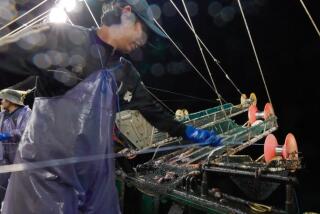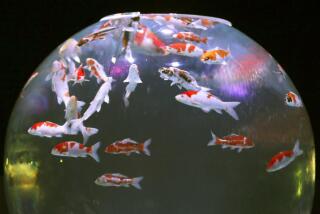This Could Be the Year Japan Prevails at Whaling Talks
- Share via
TOKYO — After a two-decade campaign, Japan appears to have mustered enough allies to win a majority on the International Whaling Commission, a victory anti-whaling activists fear would bring back the sea slaughter that once drove many species to the brink of extinction.
Since 1986, when the commission banned commercial whaling, Tokyo has risked international condemnation in its quest to restore the hunt -- an activity it describes as integral to its culture.
Now Japan’s intense lobbying of small African, Pacific and Caribbean countries is likely to allow it to prevail at the commission’s annual meeting, which opens today in the West Indian nation of St. Kitts and Nevis.
Japan’s immediate goal is to strike conservation from the commission’s agenda and authorize secret ballots on future votes.
Conservationists charge that secret voting would allow countries allegedly paid off by Japan to vote in favor of whale hunting in the future while escaping international censure.
Australia’s environment minister, Ian Campbell, at the forefront of the anti-hunt forces, has called the St. Kitts gathering “crunch time for the survival of the whales” and threatened small South Pacific nations that have joined the commission with a tourism boycott if they dare vote with Japan.
But some observers, including U.S. officials, question whether a Japanese victory would really have a drastic effect on whale populations. Ending the ban would require a 75% vote by the commission’s members, something Japan and its allies remain far short of.
Perhaps of equal significance, they note, Japanese demand for whale meat has all but collapsed, despite government campaigns to promote it. Most Japanese say they just aren’t interested in the chewy, blood-red steaks.
Opinion is divided in Japan when it comes to the taste of whale meat.
Delicious, if a bit pricey, say the businessmen who dine on pieces of the animal fat in Tokyo’s specialty restaurants, while whale meat lovers in coastal villages argue that the best bits are broiled and salted and washed down with liquor.
But many adults cringe at memories of the slabs they were forced to eat as children in postwar Japan, when protein-rich foods were rare and whale was a staple of school lunches.
The three commercial whaling nations -- Japan, Norway and Iceland -- have never actually stopped hunting.
They kill whales under rules that allow a quota for research purposes. About 2,300 of the animals will be killed this year, roughly 800 by Japanese whalers.
Meat from that ostensibly scientific hunt ends up in Japanese supermarkets and, amid pressure from the Japanese government, increasingly on school menus and in family-style restaurant chains.
Despite the government’s efforts, “the whale meat diet is becoming more and more obsolete in Japan,” said Junko Sakuma, an anti-whaling activist and author of a report that used statistics from Japan’s fisheries agency to show that whale meat was piling up unsold in industrial freezers.
Even the recent health scare over mad cow disease that resulted in a ban on North American beef failed to push Japanese consumers to eat more whale meat, figures show.
That lack of demand has not consoled conservationists, who along with opponents have gathered in the St. Kitts capital, Basseterre, for the five-day culmination of months of scientific debate and diplomatic wrestling.
Conservationists suffered a blow this week when the Greenpeace protest vessel Arctic Sunrise was denied entry into Basseterre Bay.
National Security Minister Dwyer Astaphan would say only that the decision was made by the Cabinet.
Greenpeace activist John Bowler disparaged the action, as well as the expected whaling commission move to hold secret ballots.
“People are going these days for more democracy, more openness. The commission will be going backward,” he said from the Greenpeace vessel.
Whaling opponents contend that Japan has won over developing nations with lavish aid to their fishing industries and ensured their participation in the whaling meeting by paying travel expenses and dues -- charges Tokyo denies despite evidence that has surfaced to support them.
“It’s very hard to see otherwise how countries like Tuvalu, Kiribati or Cambodia would choose to make IWC one of their main overseas concerns,” said Vassili Papastavrou, a marine biologist with the International Fund for Animal Welfare.
Last year, Japan narrowly lost on its proposals at the commission only because several of the developing nations failed to show up for the meeting.
Japanese officials say whale populations are healthy and can withstand more hunting. Conservationists warn that some stocks may be endangered, even if estimates of the numbers are hard to come by.
Whales that populate coastal waters off non-whaling countries, such as the California gray whale, have recovered during the 20-year-old ban, Papastavrou noted.
“There is no need for commercial whaling in today’s world,” said Patricia Forkan, president of Humane Society International.
“No humane methods exist to hunt whales, and it is impossible to justify such crude and indifferent reliance on the exploding harpoon and other instruments that inflict massive pain before death.”
Tokyo’s determination to defend an industry with little economic significance to Japan puzzles outside observers. They attribute it to a small caucus of politicians who have turned the issue into one of “culinary imperialism,” in which Japan is defiantly asserting that it will not be told what to eat, any more than Australians should be told not to eat kangaroo.
Still others attribute the campaign to a fisheries bureaucracy that doesn’t know how to surrender on an issue that has motivated it for so long.
Japan’s Foreign Ministry strikes a less hawkish tone, acknowledging that there is little domestic political pressure on the government to save the whaling industry.
“We don’t think many Japanese companies are interested any longer in resuming commercial whaling,” said Tomohiko Taniguchi, a spokesman for the ministry.
“Nor are we making an argument that this is part of our culture.
“Look,” he said, “this is not something that could start the Third World War. This is not an industry on which the Japanese economy hinges. It is not Toyota.”
Wallace reported from Tokyo and Williams from Miami.
More to Read
Sign up for Essential California
The most important California stories and recommendations in your inbox every morning.
You may occasionally receive promotional content from the Los Angeles Times.











